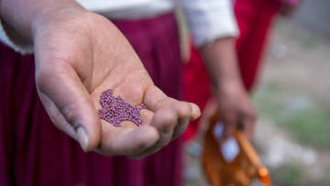Punitive World Bank conditions undermine farmers' rights

Photo Credit: CAFOD
Source: CAFOD
A campaign has been launched in opposition to the World Bank's conditions on country loans, which lead to legislation that undermines farmers' rights to seeds.
The conditions are placed on financing for governments in the Global South. Loans can include demands for seed laws that push farmers towards buying seeds from a handful of giant corporations. These seed laws can prevent small-scale farmers from using their own seeds or sharing seeds amongst themselves, a practice that has existed successfully for generations.
To support small-scale farmers from across the world, leading international aid agency CAFOD is calling on people to write to the UK's representative at the World Bank, Vel Gnanendran, to urge him to end this damaging practice.
Dario Kenner, a policy lead at CAFOD said:
"The World Bank's harsh conditions are undermining small-scale farmers' ability to grow what they want, while helping big business increase their market share and line their pockets.
"Tackling food insecurity must prioritise supporting farmers, not just agribusiness corporations who make huge profits. The only way we will begin to tackle the global food crisis is by giving back control to small-scale farmers, so they can use the seeds they sow rather than being pushed to buy seeds from faceless corporations."
The campaign has been supported by over 1,600 people already, with over 1,000 emailing Vel Gnanendran in just 24 hours.
The World Bank has pushed seed laws in country after country, pursuing a development model that benefits private companies over the people producing and consuming the food. In Africa in the last 10 years, the World Bank has placed conditions on financing to Central African Republic, Chad, Ghana, Sierra Leone, Liberia, Mozambique, Nigeria and Niger, requiring implementation of seed regulations.
These laws have opened up the seeds and fertiliser markets to agribusinesses, but the World Bank cannot convincingly show that increasing private sector control of seed supply chains has an overall positive long-term impact on reducing poverty and food insecurity.
Instead, farmers are struggling to access the diverse range of seeds they need to combat the effects of climate change and grow nutritious foods for their families.
There are alternatives to the World Bank approach, which work for small-scale farmers and for local communities. CAFOD supports Salina, a small farmer in Bangladesh.
For the past two years Salina has been able to grow better quality crops by getting her seeds from a seed bank. This means she does not have to pay for the expensive fertiliser demanded by corporate-controlled seeds. Coupled with the higher price her organic produce attracts at market, she's been able to provide more for her family. However, she is acutely aware that being dependent on buying seeds and fertiliser from big agribusiness has a big impact on other farmers in her community: "I believe the companies do not care for the farmers. They are in it for their profits. So, the company seed is not designed for farming, it is designed for business. I think seeds and business should not go together."
The CAFOD campaign is calling on the World Bank to end these damaging practices by:
- Putting an end to all policies that limit small farmers' choice over which seeds they can access.
- Protecting the fundamental rights of small farmers to save, use, exchange and sell their own varieties of seeds.
The World Bank's annual Spring meetings offer an opportunity to reverse these conditions and CAFOD will be campaigning to put pressure on the Bank to implement change.
For further details on the CAFOD campaign, please see: https://cafod.org.uk/Campaign/Fix-the-Food-System


















